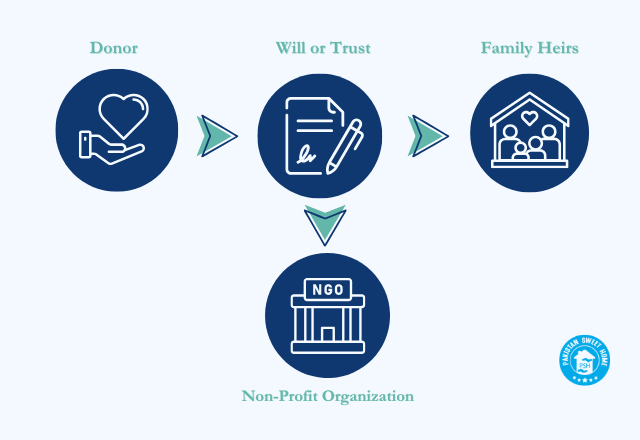A charitable bequest is more than just a financial decision; it’s a powerful way to leave a lasting impact.
By including charitable bequests in your will, you can support the causes you care about and ensure your legacy lasts. Whether it’s contributing to a foundation, trust, or NGO, your generosity can shape the future and uplift those in need.
But how exactly do charitable bequests work? And what steps should you take to make one?
Let’s explore the process, benefits, and considerations of leaving a bequest to charity.
What Is a Charitable Bequest?
A charitable bequest is a gift made to a charity as part of someone’s estate after their passing. It is one of the simplest and most impactful ways to leave a legacy and support causes that matter to you.
Bequests can be arranged through a will, living trust, or codicil, ensuring your intentions are clearly outlined. You can direct assets like insurance policies, retirement, or bank accounts to a charity through beneficiary designations.
These gifts are seamlessly transferred to the chosen charity after the donor’s passing, creating a lasting impact. On International Charity Day, many people decide to leave a bequest, ensuring their legacy supports global causes for generations to come.
Types of Charitable Bequests
Charitable bequests can be categorized into four main types:
- General Bequests: Gifts from the general assets of your estate, such as a fixed Rupees or dollar amount.
- Demonstrative Bequests: Gifts from a specific source, like a designated bank account.
- Specific Bequests: Gifts of tangible property, like jewelry, real estate, or stocks.
- Residuary Bequests: A gift from the remaining estate after paying administrative expenses and creditor claims. This includes all other listed bequests—general, specific, and demonstrative.
For example, you might leave specific bequests to family members. You can also allocate a residuary gift to a charity, ensuring both your loved ones and philanthropic goals are cared for.
Considerations for Charitable Bequests
When planning a bequest, keep these important points in mind:
Discuss Your Bequest
It’s essential to discuss your bequest plans with your family, beneficiaries, and the charity you wish to support. This transparency helps avoid misunderstandings and ensures everyone is aware of your intentions.
Clear communication ensures the organization understands your vision and can prepare for your generous contribution. By discussing your bequest, you can clarify the ways of charity, ensuring your gift aligns with your values and goals.
Anticipate Practical Challenges
If you plan to leave non-monetary assets, such as real estate or valuable items, ensure the charity can manage them effectively.
Some organizations might face logistical or financial difficulties in handling such gifts. Working with the charity beforehand ensures your contribution is valuable and practical for them to use.
Review Regularly
Your estate plan should be revisited periodically to reflect changes in your life, finances, or charitable goals.
Circumstances such as marriage, new causes of interest, or shifts in a charity’s mission can affect your plans. Regular reviews ensure your bequest remains relevant and aligned with your current priorities.
For example, leaving a historic home to a preservation society might require additional funds for upkeep. Collaborating with the charity in advance ensures your gift of giving is both meaningful and manageable.
Steps to Plan a Charitable Bequest
Planning a bequest doesn’t have to be overwhelming.
Here’s a step-by-step checklist to guide you:
1. Determine the Bequest Amount
Decide if you want to leave a fixed sum or a percentage of your assets. Consider potential changes in the size of your estate and ensure your decision reflects your priorities.
2. Set Contingency Provisions
Think about scenarios where your primary beneficiaries may no longer be alive. In such cases, you can specify that the charity receives the assets instead.
3. Define the Use of Funds
Decide whether your donation will support a specific program or be added to the charity’s general fund. Clear and written instructions help ensure that your wishes are respected and followed.
4. Communicate with the Charity
Share your plans with the organization to confirm they can fulfill your intentions. This collaboration also gives them a chance to thank you personally.
5. Consult Professional Advisors
Work with a financial advisor or attorney to create a legally sound plan for supporting your chosen type of NGO. They can guide you on whether a will or trust is the best approach and ensure all legalities are addressed.
6. Designate a Successor
If the charity closes or changes its mission, name a backup organization or allow your executor to choose a suitable alternative.
Benefits of Charitable Bequests
Charitable bequests offer numerous advantages:
Flexibility
Charitable bequests are flexible and can be adjusted as your situation changes. Whether your finances change, priorities shift, or new causes inspire you, you can update your bequest to match your wishes. This ensures that your generosity aligns with your intentions, no matter what life brings.
Tax Benefits
Making a charitable bequest can lower the estate taxes your beneficiaries may face. Donations to recognized charities are tax-deductible, letting more of your estate go to your cause. This helps both the charity and your financial planning.
Legacy Creation
A charitable bequest enables you to leave a lasting legacy that reflects your values and passions.
By supporting causes that matter to you, such as NGOs for children, the elderly, or widows, you create a meaningful impact. This legacy continues to make a difference long after you're gone. It’s a way to ensure that your life’s purpose and generosity inspire others for generations to come.
Efficiency
Including clear instructions for a bequest in your will makes the estate distribution process easier. Executors can follow your wishes without confusion, ensuring your gift is delivered quickly. This clarity reduces administrative burdens and potential disputes among beneficiaries.
Recognition
A bequest gift allows you to create a lasting legacy with an organization that aligns with your values. Nonprofits offer various ways to recognize and honor these gifts, depending on the designated funding.
For example, a university may require a specific amount to create a named scholarship. The same funding amount would apply to bequest gifts.
Difference between Donation and Charitable Bequest
A key difference between donations and bequests is the timing of the gift. Donations are made while the donor is alive and can be used immediately to support the nonprofit's programs and services.
Charitable Bequests, on the other hand, are received after the donor's passing. These gifts may be used for long-term projects that benefit the organization for years to come.
Another distinction is the level of donor involvement. Living donors can engage more actively by volunteering or attending events. In contrast, bequest donors' involvement is limited to specifying the terms of the gift in their will or estate plan.
Why Choose Pakistan Sweet Home for Your Charitable Bequest?
Imagine leaving behind a legacy that echoes in eternity—a gift that transforms lives and brings hope to those who need it the most. By giving a bequest to the registered orphanage NGO, Pakistan Sweet Home, you are investing in your Akhira (Hereafter).
Your charity will be a sadaqah jariyah—a lasting reward that grows as each child thrives, learns, and helps society. It’s a legacy of love and compassion that reflects your deepest values, bringing you eternal blessings and peace.
What better investment for your hereafter than the smiles and prayers of those who will remember your kindness for generations?
Your contribution will provide orphaned children with shelter, education, and care. This support will empower them to grow into strong, capable individuals who can shape a brighter future for themselves and others.
In conclusion, a charitable bequest is a powerful way to leave a lasting legacy and support causes that align with your values. By understanding the types, considerations, and benefits of bequests, you can make an informed decision. This ensures that your generosity continues to make a difference long after you're gone.
Unlike a donation, which is given during your lifetime and used immediately, a charity bequest is received after your passing. It can then support long-term projects that have a lasting impact. Whether big or small, your bequest can transform lives and inspire change. With thoughtful planning, you create a legacy of compassion that impacts future generations.
Create a Legacy of Love for an Orphan

info@pakistansweethome.org.pk
(051) 4865856
+92 335 1118477





